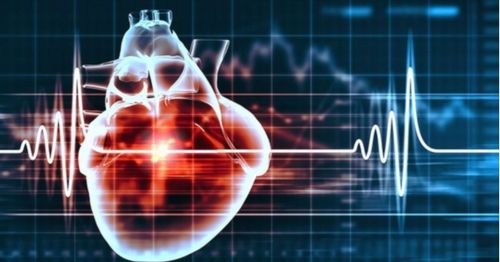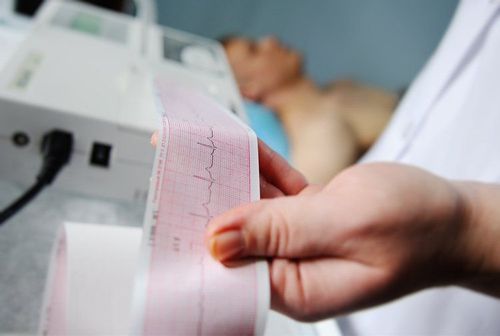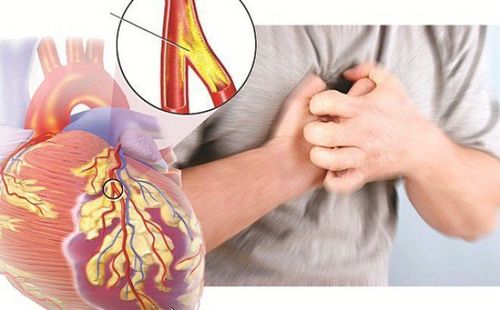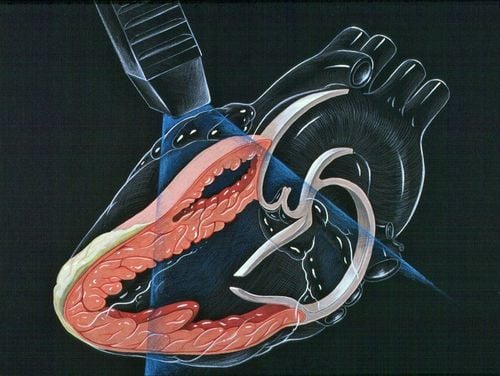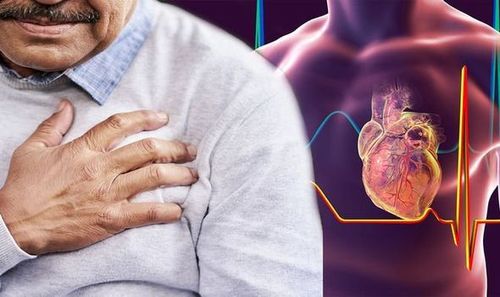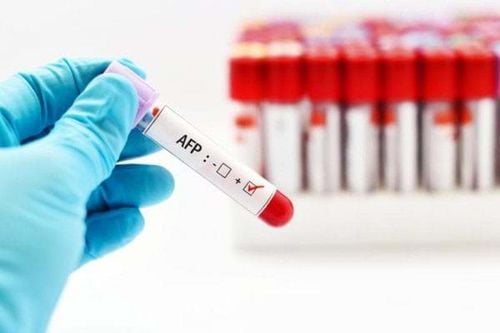This is an automatically translated article.
Article written by Associate Professor, Doctor, Doctor Le Ngoc Hung - Laboratory Department - Vinmec Central Park International General Hospital
Troponin is a protein released when the heart muscle is damaged. Therefore, this is considered a method of diagnosing myocardial infarction with high accuracy. Currently, high sensitive troponin tests are recommended to be used, replacing the previous Troponin tests.
1. What does myocardial infarction mean?
Myocardial infarction is a condition in which some of the muscles of the heart are severely damaged or die. A heart attack usually occurs when one of the blood vessels that carry blood to the heart muscle is blocked. The problem occurs when a blood clot forms in a partially narrowed vessel. The arteries are narrowed due to hardening of the arteries (atherosclerosis). The blockage occurs gradually over many years as the lipid plaque closes up against the wall of the blood vessel. These fragments narrow and harden the artery and can rupture abnormally, completely clogging the damaged artery.
Trắc nghiệm: Huyết áp của bạn có đang thực sự tốt?
Huyết áp cao hay thấp đều ảnh hưởng đến tình trạng sức khỏe con người. Để biết tình trạng huyết áp của bạn có thực sự tốt không, hãy làm bài trắc nghiệm sau đây để đánh giá.2. What is Troponin?
Troponins are a group of proteins found in skeletal muscle and cardiac muscle fibers, responsible for regulating muscle contraction. The troponin test measures heart-specific troponins present in the blood to detect damage to the heart muscle.
There are 3 groups of troponin proteins: troponin C, troponin T, and troponin I. Troponin C initiates muscle contraction by binding to calcium and displacing troponin I followed by two proteins that shorten muscle fibers to interact. Troponin T connects to the troponin complex to form the muscle fiber structure. There is little or no difference in troponin C between striated and smooth muscle fibers, but the troponin I and troponin T compositions are very different.
Measurement of heart-specific troponin I and troponin T blood levels can help diagnose heart damage. Normally, troponin is present very little in the blood. When there is damage to heart muscle cells, troponin is released into the bloodstream. The more damage to the heart muscle tissue, the higher the troponin concentration in the blood. Intentional troponin is a test to confirm whether a person has had a heart attack. Troponin T and I tests are used to evaluate other forms of heart damage.
The troponin test has been studied for a long time, but the US Food and Drug Administration (FDA) only approved it in 2017. Because the new version of this test is more sensitive than the old version, it is positive. early detection and early detection of cardiac damage and acute coronary syndromes. The hs-troponin test may be positive in patients with stable chest pain and even in asymptomatic individuals. When troponin is elevated in these individuals, the marker increases the risk of future cardiovascular events such as myocardial infarction.
When a person has a heart attack, troponin I and T levels can rise in the blood within 3-4 hours of the injury and can last 10 to 14 days.
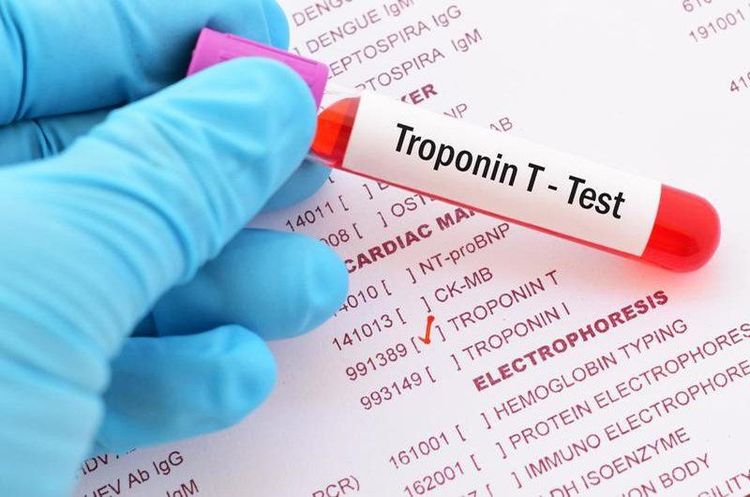
Xét nghiệm troponin giúp chẩn đoán có tổn thương tim
3. How is the troponin test used?
The hs-troponin test is mainly used in the diagnosis of myocardial infarction and helps to rule out other causes that produce similar signs and symptoms. Both hs-troponin T and hs-troponin I tests can be used, usually each laboratory chooses one of the two to use. The concentrations of these two tests are different, but provide the same informational meaning.
The troponin test is also used to evaluate heart damage from causes other than myocardial infarction or to differentiate signs and symptoms, such as chest pain from other causes. The test is also used to evaluate patients with stable chest pain if signs and symptoms worsen.
Troponin is sometimes indicated in conjunction with other cardiovascular biomarkers, eg CK-MB or myoglobin. However, troponin is the most used test for the diagnosis of myocardial infarction because it is more specific for cardiac injury than other tests and remains elevated for a long time.
4. When is a troponin test ordered?
Troponin testing is usually ordered when a person with suspected myocardial infarction is admitted to the emergency department, followed by a series of troponin tests over several hours.
Myocardial infarction may be suspected and testing is indicated when the patient has the signs and symptoms described below. However, these are not all symptoms of the disease, patients may experience chest pain, but in women often have atypical symptoms and signs.
Chest pain, discomfort or heaviness in the chest Tachycardia, loss of rhythm Shortness of breath and/or shortness of breath Extreme fatigue Nausea, vomiting Cold sweats Panic If the patient has stable chest pain, the troponin test is indicated. determined when symptoms worsen, symptoms appear at rest, and symptoms do not subside after therapy.
These symptoms suggest that chest pain has become unstable, increasing the risk of a heart attack or other cardiovascular problems in the near future.
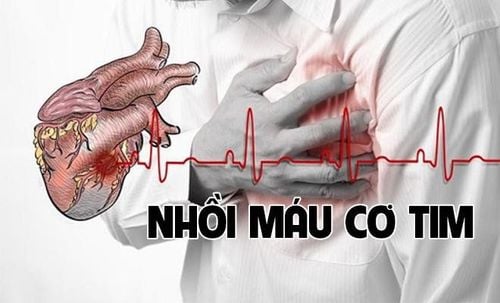
Khi 1 ng có dấu hiệu bị nhồi máu cơ tim thì được xét nghiệm troponin
5. What do test results mean?
High levels of troponin and even a slight increase are indicative of some degree of heart damage. When a person has a severe increase in troponin and especially has a high or low rise in the results of a series of tests over several hours, there is a high chance of having a heart attack or another form of heart attack. myocardial damage. Troponin levels are usually elevated in the blood 3-6 hours after myocardial injury and can persist for 10-14 days.
An elevated troponin level cannot be used to diagnose or rule out myocardial infarction. Physical examination, history, and electrocardiogram are also important. Your doctor may need to look at troponin levels over a series of tests to see if the increase is fixed or if it rises or falls over several hours of testing.
For patients with chest pain, an increase in troponin indicates a worsening of the patient's condition, and an increased risk of myocardial infarction. Troponin may be elevated in other cardiac conditions such as myocarditis, cardiomyopathy or heart failure, and in some situations not directly related to the heart, such as severe infection, kidney disease.
Normal values of troponin in a series of measurements over several hours indicate no cardiac damage. Clinical signs and symptoms not related to the heart.
99th percentile value of hs-Troponin I: 0.04 ng/ml 99th percentile value of hs-Troponin T: 0.014 ng/ml Since the troponin test measures cardiac troponin specifically, the test is not Affected by skeletal muscle damage, infections, accidents, and drugs that can damage muscle do not affect troponin levels. However, some studies have shown that troponin elevation occurs in people with rhabdomyolysis. Although troponin may be elevated after intense physical activity, it is not associated with clinical signs and is usually of no clinical importance.
Very rarely, patients with myocardial infarction have normal troponin values, in some cases patients have elevated troponin but no signs of myocardial infarction. To diagnose the disease, in addition to the cardiac-specific Troponin test results, doctors also rely on clinical symptoms, electrocardiogram results, echocardiography, etc. Because in addition to myocardial infarction, Troponin is heart-specific. also increased in a number of other diseases such as chronic kidney failure, acute pericarditis, acute pulmonary embolism, severe acute heart failure, myocarditis, septic shock,... In addition to being used to diagnose and monitor the syndrome In acute coronary artery disease, Troponin T test is also used to predict the severity of the disease and evaluate the effectiveness of treatment.
To protect general heart health and detect early signs of heart attack and stroke. Currently, Vinmec International General Hospital has been and continues to deploy the Cardiovascular Screening Package - Basic Cardiovascular Examination. The patient examination package detects cardiovascular problems at the earliest through tests and modern imaging methods. The package is for all ages, genders and is especially essential for people with risk factors for cardiovascular disease.
Customers can directly go to Vinmec Health system nationwide to visit or contact the hotline here for support.




